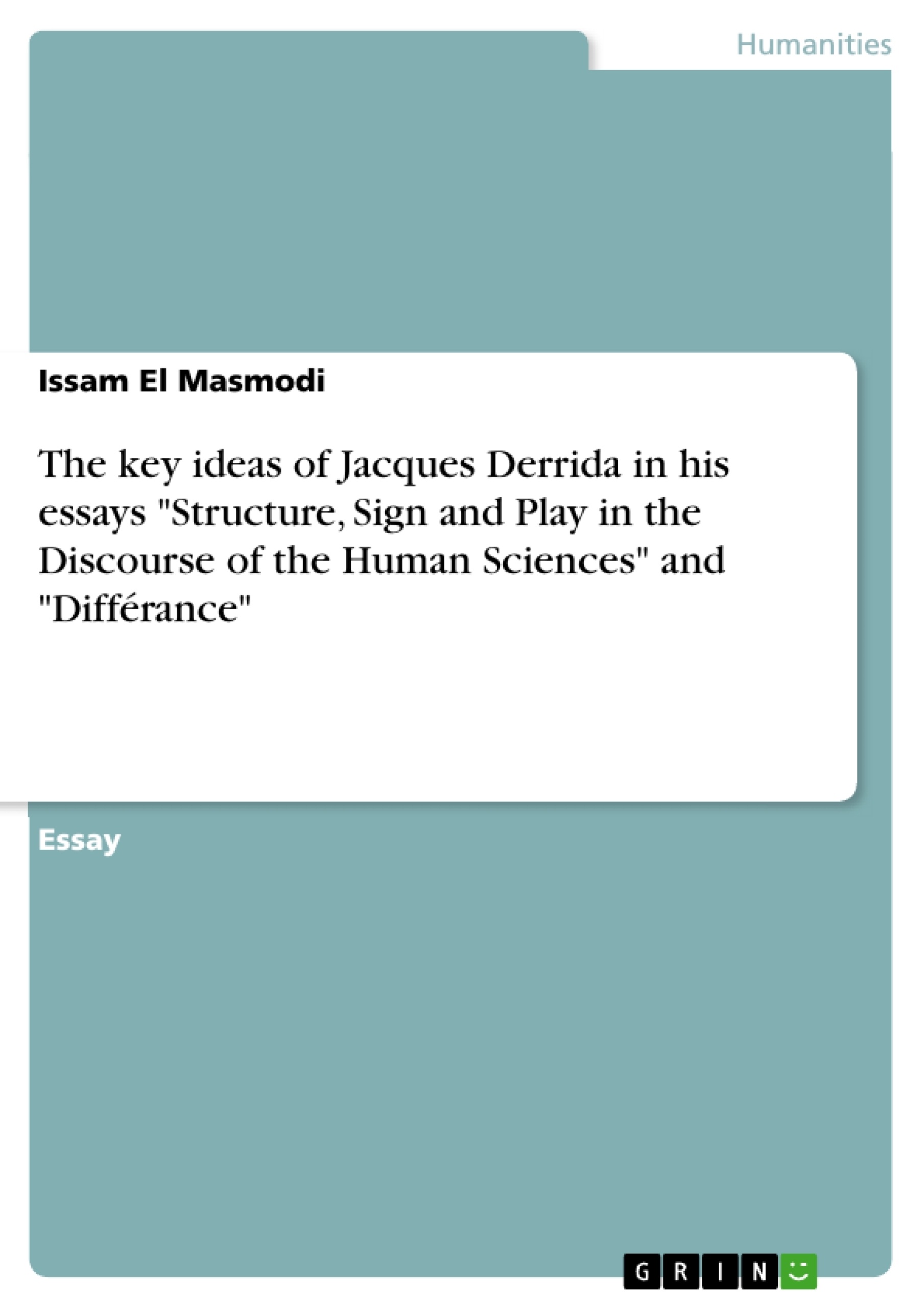This paper tends to deal mainly with Derrida’s both essays of "Structure, Sign and Play in the Discourse of the Human Sciences" and "Différance". It tries to show some of his key ideas and his outstanding status in the postmodern school of thought in the light of his aforementioned essays.
The first things that come to our minds when we hear the name of Jacques Derrida are Deconstruction, Différance, Post-structuralism, Post-modernism, Writing and Differance, Of Grammatology and so on. This illustrates that we are already familiar with Derrida. However, the majority of people complain about Derrida’s complexity of his writings as well as the difficulty of translating his works. One of the most illustrative examples is the preface of Gayatri Chakravorti Spivak to Derrida‘s "Of Grammatology" in which she states "when the preface is being written by someone other than the author, the situation is yet further complicated. A pretense at writing before a text that one must have read before the preface can be written".
Spivak’s statement is a real example of the inseparable relationship between reading and writing. Reading is breathing in whereas writing is breathing out. Alan Bass, a translator of Derrida, suggests that the difficulty to read Derrida is not a question of his style of writing but rather Derrida challenges the way we are used to read. Besides, Alan Bass compares the translator of Derrida to a psychoanalyst in the sense that the translator must understand the syntax and lexicon of the original text in order to transform it through his own language. This is quite analogous with the attempt of the psychoanalyst to translate the language of dreams into a latent language.
Table of Contents
- Introduction
- Structure, Sign and Play in the Discourse of the Human Sciences
- Anti-Structuralism
- Decentering the center
- Différance
- Against the definition of différance
- Deconstruction
Objectives and Key Themes
This paper aims to analyze Jacques Derrida's essays "Structure, Sign and Play in the Discourse of the Human Sciences" and "Différance," highlighting his key ideas and their impact on postmodern thought. The paper delves into Derrida's critique of structuralism and his concept of deconstruction, examining his engagement with prominent thinkers like Nietzsche, Freud, and Heidegger.
- Deconstruction of Structuralism
- The concept of différance
- The influence of Nietzsche and other thinkers on Derrida's work
- The nature of meaning and language
- The role of deconstruction in textual analysis
Chapter Summaries
- Introduction: This chapter introduces Derrida's work and his influential concepts like deconstruction, différance, and post-structuralism, highlighting the challenges readers encounter in understanding his complex writings.
- Structure, Sign and Play in the Discourse of the Human Sciences: This chapter explores Derrida's critique of structuralism, focusing on the work of Ferdinand de Saussure and Claude Lévi-Strauss. Derrida argues that structuralism's reliance on a central organizing principle limits its ability to account for the complex play of meaning within language and culture.
- Anti-Structuralism: This chapter delves into Derrida's rejection of structuralism's reliance on fixed structures and its binary oppositions, particularly in relation to Lévi-Strauss's theories on kinship and cultural systems. Derrida's critique emphasizes the fluidity and instability of meaning, arguing that structures are constantly in flux.
- Decentering the Center: This chapter examines Derrida's concept of "decentering the center," challenging the idea of a fixed point of reference within structures. He argues that the center is not a stable foundation but rather a product of the system itself, subject to constant movement and displacement.
- Différance: This chapter explores Derrida's neologism "différance," a term that signifies both "differing" and "deferring." It highlights the concept of meaning as perpetually deferred and the interconnectedness of concepts, emphasizing the role of repetition and otherness in the formation of meaning.
- Against the definition of différance: This chapter examines Derrida's argument that différance cannot be defined or captured as a concept, highlighting its elusive nature and its resistance to traditional modes of understanding.
- Deconstruction: This chapter discusses Derrida's concept of deconstruction as a method for uncovering the hidden assumptions and contradictions within texts. It explores the relationship between deconstruction and other critical schools, emphasizing its focus on revealing the indeterminacy and instability of meaning.
Keywords
Derrida's work focuses on key concepts like deconstruction, différance, post-structuralism, semiology, structure, sign, play, meaning, language, culture, and textual analysis. His writing engages with major thinkers such as Nietzsche, Freud, Heidegger, Saussure, Lévi-Strauss, and Hegel, and examines their contributions to understanding the nature of knowledge and the human condition.
- Quote paper
- Issam El Masmodi (Author), 2019, The key ideas of Jacques Derrida in his essays "Structure, Sign and Play in the Discourse of the Human Sciences" and "Différance", Munich, GRIN Verlag, https://www.grin.com/document/510094




